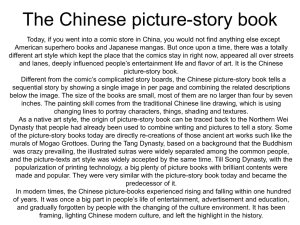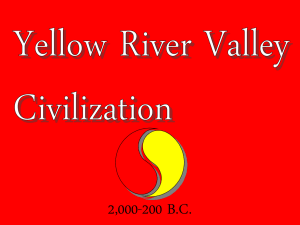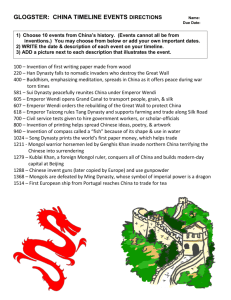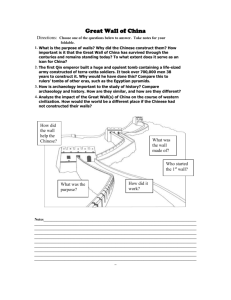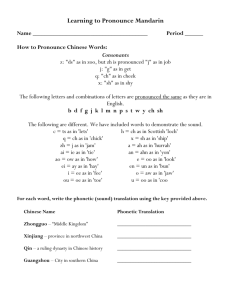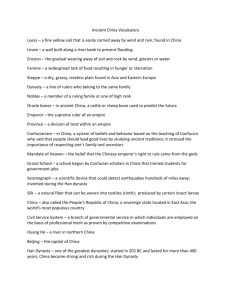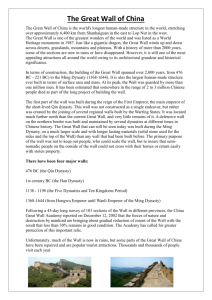China and the world comparative timeline
advertisement
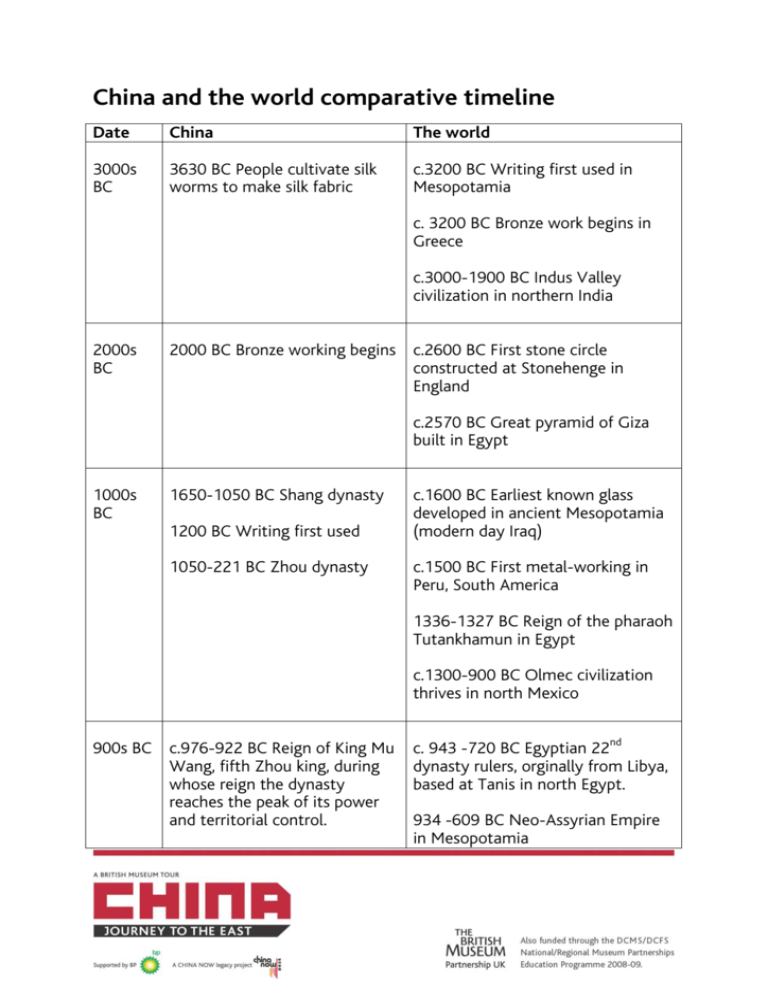
China and the world comparative timeline Date China The world 3000s BC 3630 BC People cultivate silk worms to make silk fabric c.3200 BC Writing first used in Mesopotamia c. 3200 BC Bronze work begins in Greece c.3000-1900 BC Indus Valley civilization in northern India 2000s BC 2000 BC Bronze working begins c.2600 BC First stone circle constructed at Stonehenge in England c.2570 BC Great pyramid of Giza built in Egypt 1000s BC 1650-1050 BC Shang dynasty 1200 BC Writing first used 1050-221 BC Zhou dynasty c.1600 BC Earliest known glass developed in ancient Mesopotamia (modern day Iraq) c.1500 BC First metal-working in Peru, South America 1336-1327 BC Reign of the pharaoh Tutankhamun in Egypt c.1300-900 BC Olmec civilization thrives in north Mexico 900s BC c.976-922 BC Reign of King Mu Wang, fifth Zhou king, during whose reign the dynasty reaches the peak of its power and territorial control. c. 943 -720 BC Egyptian 22nd dynasty rulers, orginally from Libya, based at Tanis in north Egypt. 934 -609 BC Neo-Assyrian Empire in Mesopotamia 800s BC 841 BC is taken by Chinese historians as the first year of consecutive annual dating, based on the Records of the Grand Historian by Sima Qian. 813 BC City of Carthage in North Africa is founded by the Phoenicians 700s BC 780 BC First historic solar eclipse recorded in China. 700s BC Coins start to be used in Lydia, now part of western Turkey. c.800 BC First writing in the Americas is produced by the Zapotec people of Mesoamerica. 771 BC End of Western Zhou dynasty as the capital Hao is sacked. Zhou rule continues from a new capital to the east. 730 BC Egypt falls to the rule of the 770-476 BC Spring and kings of Nubia (modern day Sudan) Autumn Period as central control under the Eastern Zhou is weak and local rulers emerge. c.750 BC First metal coins used 600s BC c.604-531 BC Life of the Daoist c. 625 – 500 BC First archaeological evidence for the urbanization of philospher Laozi Rome 500s BC 591 BC Death of Sunshu Ao, China's first hydraulic engineer, who created an artificial reservoir by damming a river for a large scale project while working for Duke Zhuang of Chu. 552-479 BC Life of Confucius 528 BC Gautama Buddha attains Enlightenment and begins his ministry, thereby founding Buddhism in India. 510 BC Roman Republic established. c.500 BC First large villages established on the coasts of Alaska, north America 400s BC 400s BC Crossbow is invented 475-221 BC Warring States Period 431-404 BC Peloponnesian Wars between the Greek cities of Athens and Sparta. 300s BC c.300 BC Compass invented and first use of cavalry in the Chinese army c.321 BC Mauryran empire founded on the Indian subcontinent. 200s BC 221-207 BC Qin dynasty. c.200 BC Iron starts to be used in western, and then eastern, Africa 221-210 BC Construction of the first Great Wall from packed earth 206 BC-AD 200 Han dynasty 146 BC Final victory of Rome over 100s BC 141-87 BC Reign of the Han Emperor Wu, considered one of Carthage in North Africa. the greatest emperors in Chinese history as the Chinese empire reaches its greatest extent. 99-1 BC 91 BC Completion of the Records of the Great Historian by Sima Qian – the first systematic history of China from c. 2600 BC until his own times. c.80-60 BC Coin production starts in England. 51-30 BC Reign of Cleopatra VII as last pharaoh of Egypt 48-44 BC Rule of Julius Caesar in Rome. 28 BC First known written references to sunspots made by 27 BC Augustus begins his rule as Chinese astronomers. first emperor of the Roman empire. AD 1-99 AD 1-100 Buddhism introduced AD 1-100 The kingdom of Aksum in into China from India east Africa flourishes as a centre of maritime and land trade with India and the Roman empire AD 31 Du Shi, Chinese engineer and statesman, invents the AD 43 Britain becomes part of the first-known hydraulic-powered Roman empire. The first written script (Latin) is used in Britain. bellows to heat the blast furnace used when smelting cast iron. AD 100s c. AD 105 Cai Lun invents paper AD 122 Hadrian’s Wall built across northern Britain AD 184-205 Yellow Scarves (Turbans) Rebellion of Chinese peasants against Imperial farming taxes AD 200s AD 220 Emperor Xian, the last Han emperor, abdicates. AD 255 Construction begins on the final section of a wall around London. AD 221-589 Period of Disunity AD 300s AD 322 The first pictorial record of strirrups, probably a Chinese invention, to increase rider control. AD 383 Battle of Fei River between rival royal powers is considered one of the most significant battles in Chinese history. c. AD 300 Gupta empire flourishes in northern India AD 301 Armenia is the first country to adopt Christianity as state religion followed c. 320 by Ethiopia AD 400s AD 477-499 First pictorial record of the horse collar in China, this invention improved the pulling power of the horse as a beast of burden c. AD 400 First emperors rule in Japan AD 406-53 Life of Attila the Hun who establishes an empire stretching from Germany to Russia c. AD 450 Anglo-Saxon period begins in England AD 500s AD 585 Construction begins on the Grand Canal linking the Huang He (Yellow) and Chang Jiang (Yangzi) rivers AD c. 570 – 632 Life of the Islamic prophet Muhammad AD 600s c. AD 600 Porcelain invented AD 622 Muhammad leaves the Arabian city of Mecca and arrives in Medina, an event which marks the beginning of the Islamic calendar (AH 1). AD 618-906 Tang dynasty AD 630s Sa`d ibn Abi Waqqas establishes the first Islamic mosque of China in Guangzhou AD 690-705 Reign of the Emperess Wu Zetian AD 700s Li Bai (AD 701-62) and Du Fu (AD 712-770) are considered the two greatest Chinese poets AD 742 Census of the Tang capital Chang’an (and local area) record a population of 1,960,188 people. (England had a population of around 1, 000, 000 people in AD 1086.) AD 597 Augustine arrives in Kent to convert England to Christianity c.AD 658–684 First English poem (a religious hymn) written by the monk Caedmon AD 789 First recorded Viking raid on Britain occurs on the Dorset coast AD 800s AD 868 Earliest known surviving woodblock-printed book, the Diamond Sutra AD 886 Alfred, king of Wessex divides rule of England between his rule and Viking rule (Danelaw) AD 900s AD 960 -1279 Paper money invented AD 920s Horse collar introduced to Europe AD 939 Death of Athelstan, first king of all England. AD 1000s AD 1041-48 Bi Sheng invents ceramic movable type printing AD 1066 Battle of Hastings marks the begining of Norman England AD 1100s AD 1132 Gunpowder first used to fire weapons AD 1170 Murder of Thomas Becket, Archbishop of Canterbury AD 1200s AD 1279-1368 Yuan dynasty AD 1215 Magna Carta signed between King John and his nobles at Runnymede, England. AD 1300s AD 1368-1644 Ming dynasty AD 1348 The plague (Black Death) arrives in Dorset, England. AD 1400s AD 1406-21 Building of the Forbidden City in Beijing AD 1485-1603 Tudor period in Britain AD 1500s AD 1514 Chinese begin trading with the Portuguese and support econmic growth with imported silver AD 1500s Protestant Reformation in Europe AD 1588 Naval battle between English ships and an invading Spanish Armada AD 1600s AD 1644-1911 Qing dynasty AD 1600 Founding of the British East India Company for trading with southern and eastern Asia AD 1600s Paper money first used in Europe AD 1642-9 English Civil War AD 1666 Great Fire of London AD 1700s AD 1726 The encyclopedia Gujin Tushu Jicheng, running to over 800,000 pages, is printed in 60 different copies using copper-based Chinese movable type printing. AD 1711 British East India Company establishes first trading post in Guangzhou, China AD 1762-96 Reign of Catherine the Great, Tsar of Russia. AD 1771 First machine factory, a cotton mill, opens in Britain. AD 1776 Establishment of the United States of America AD 1789 French Revolution AD 1800s AD 1839-60 Trade disputes, particularly illegal trading of opium by Britain, leads to the Opium Wars. AD 1801 Act of Union creates the United Kingdom (England, Scotland, Wales and Ireland) AD 1837-1901 Victorian period in AD 1850-64 Taiping Rebellion – Britain a large scale popular revolt against the authority of the AD 1848 ‘The Communist Qing emperors Manifesto’ by Karl Marx is published in London AD 1899 Boxer Rebellion – a popular revolt against foreign influence in China. AD 1900s AD 1912 Abdication of Puyi, the last Chinese emperor AD 1949 Foundation of the Peoples’ Republic of China under the leader of the Comunist Party Mao Zedong AD 2000s AD 2003 The Chinese space program launches its first human space flight, Shenzhou 5, following 4 uncrewed missions from 1999. AD 1914-1918 First World War AD 1939-1945 Second World War AD 1997 Sovereignty of Hong Kong transferred to the People’s Republic of China AD 2000 Millenium celebrations take place across the world AD 2008 Bejing Olympics AD 2012 London Olympics



